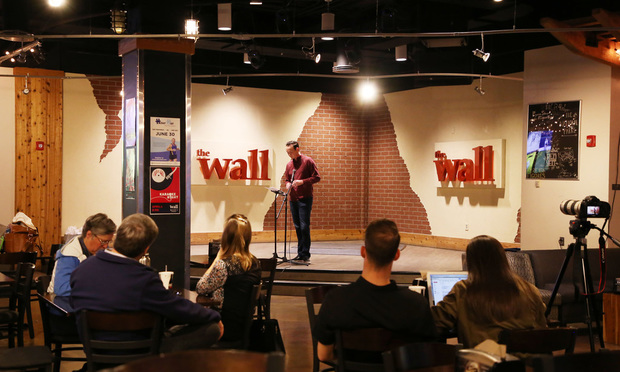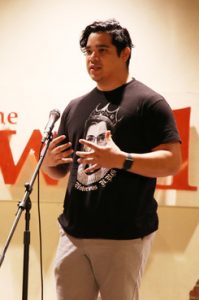BYU Law to Host First National Storytelling Competition for Law Students
Brigham Young University's law school hopes that a new national storytelling competition for law students will spur more interest in storytelling as a key skill for lawyers, and a way to connect more personally with the law.
January 30, 2019 at 12:14 PM
4 minute read
 Brigham Young University law student Brock Foley performs in the school's 2018 storytelling competition.
Brigham Young University law student Brock Foley performs in the school's 2018 storytelling competition.
Got a good story to tell about your life and the law?
The Brigham Young University J. Rueben Clark Law School wants to hear from you. The school is launching the first-ever national storytelling competition for law students, with 10 finalists getting an all-expense-paid trip to Utah in March where they will take the stage to share their stories.
Law schools have dabbled with incorporating storytelling into their curricula or as an extracurricular activity, according to BYU law dean Gordon Smith. But he said his school's new storytelling initiative, dubbed BYU LawStories on the Mainstage, is the most formal attempt yet to get law students to embrace storytelling as a way not only to be better lawyers, but to explore their personal relationship with the law.
“We want to get the students to connect emotionally to the law,” Smith said. “We think if they do, it will inspire them to work harder to be good lawyers.”
Most people immediately think of trial lawyers when they consider the value of storytelling in the law, but the skill translates well beyond the courtroom, Smith said. He recalled his former days as a transactional lawyer, where stories also played a part in his day-to-day work.
“If we were talking about a merger or public offering, we were telling stories about 'Oh, the last merger I did…' or 'I had a deal once that did this…,'” Smith said. “We were telling stories that framed the way we thought about our work as transactional lawyers.”
 Brigham Young University law student Trevor Smith performs in the school's 2018 storytelling competition.
Brigham Young University law student Trevor Smith performs in the school's 2018 storytelling competition.Rebecca Clarke, who oversees the school's publications, is shaping how BYU incorporates storytelling into the campus. Administrators were surprise to discover that the law school already had an informal student group dedicated to storytelling, so it decided to collaborate by bringing in guests to talk about storytelling techniques. BYU held its first internal storytelling competition for law students last year, which proved a success. Participants talked about their clerkships or ways in which the law had impacted their lives.
“What I learned from that experience was that it was tremendously affirming to those students who participated in the competition—to show that part of their personality to their classmates and professors,” Smith said. “They said they learned a tremendous amount about themselves, through telling their stories.”
Utah is a natural location to incubate law student storytelling talent, given that storytelling is important within the Mormon faith, Smith pointed out. The law school's region is home to one of the nation's largest annual storytelling festivals, the Timpanogos Storytelling Festival. And a nationally syndicated radio show about storytelling, The Apple Seed, records on the BYU campus.
BYU decided to take its law student storytelling competition national this year in hopes of finding the best stories. Applicants have until Feb. 20 to submit a nonfiction narrative of 1,000 to 1,500 words that ties together their life and the law. The school will bring 10 finalists to campus March 13 to 16, where they will have a half-day seminar on storytelling from the host of The Apple Seed. The main competition will be open to the public. Afterward, the finalists will travel to Moab to visit some of Utah's famous national parks.
“We're looking for something that has a true story arc or narrative to it—something where you see a perceptual shift, growth or change,” Clarke said. “We're looking for great hooks and great endings, things that are not too didactic but leave you with a sense of theme or purpose. We want to hear a sense of voice in the stories. We want to hear that student come through.”
This content has been archived. It is available through our partners, LexisNexis® and Bloomberg Law.
To view this content, please continue to their sites.
Not a Lexis Subscriber?
Subscribe Now
Not a Bloomberg Law Subscriber?
Subscribe Now
NOT FOR REPRINT
© 2025 ALM Global, LLC, All Rights Reserved. Request academic re-use from www.copyright.com. All other uses, submit a request to [email protected]. For more information visit Asset & Logo Licensing.
You Might Like
View All
University of Chicago Accused of Evicting Student for Attending Gaza-Israel Protest
3 minute read
Sanctioned Penn Law Professor Amy Wax Sues University, Alleging Discrimination
5 minute read

The Met Hires GC of Elite University as Next Legal Chief
Trending Stories
- 1How ‘Bilateral Tapping’ Can Help with Stress and Anxiety
- 2How Law Firms Can Make Business Services a Performance Champion
- 3'Digital Mindset': Hogan Lovells' New Global Managing Partner for Digitalization
- 4Silk Road Founder Ross Ulbricht Has New York Sentence Pardoned by Trump
- 5Settlement Allows Spouses of U.S. Citizens to Reopen Removal Proceedings
Who Got The Work
J. Brugh Lower of Gibbons has entered an appearance for industrial equipment supplier Devco Corporation in a pending trademark infringement lawsuit. The suit, accusing the defendant of selling knock-off Graco products, was filed Dec. 18 in New Jersey District Court by Rivkin Radler on behalf of Graco Inc. and Graco Minnesota. The case, assigned to U.S. District Judge Zahid N. Quraishi, is 3:24-cv-11294, Graco Inc. et al v. Devco Corporation.
Who Got The Work
Rebecca Maller-Stein and Kent A. Yalowitz of Arnold & Porter Kaye Scholer have entered their appearances for Hanaco Venture Capital and its executives, Lior Prosor and David Frankel, in a pending securities lawsuit. The action, filed on Dec. 24 in New York Southern District Court by Zell, Aron & Co. on behalf of Goldeneye Advisors, accuses the defendants of negligently and fraudulently managing the plaintiff's $1 million investment. The case, assigned to U.S. District Judge Vernon S. Broderick, is 1:24-cv-09918, Goldeneye Advisors, LLC v. Hanaco Venture Capital, Ltd. et al.
Who Got The Work
Attorneys from A&O Shearman has stepped in as defense counsel for Toronto-Dominion Bank and other defendants in a pending securities class action. The suit, filed Dec. 11 in New York Southern District Court by Bleichmar Fonti & Auld, accuses the defendants of concealing the bank's 'pervasive' deficiencies in regards to its compliance with the Bank Secrecy Act and the quality of its anti-money laundering controls. The case, assigned to U.S. District Judge Arun Subramanian, is 1:24-cv-09445, Gonzalez v. The Toronto-Dominion Bank et al.
Who Got The Work
Crown Castle International, a Pennsylvania company providing shared communications infrastructure, has turned to Luke D. Wolf of Gordon Rees Scully Mansukhani to fend off a pending breach-of-contract lawsuit. The court action, filed Nov. 25 in Michigan Eastern District Court by Hooper Hathaway PC on behalf of The Town Residences LLC, accuses Crown Castle of failing to transfer approximately $30,000 in utility payments from T-Mobile in breach of a roof-top lease and assignment agreement. The case, assigned to U.S. District Judge Susan K. Declercq, is 2:24-cv-13131, The Town Residences LLC v. T-Mobile US, Inc. et al.
Who Got The Work
Wilfred P. Coronato and Daniel M. Schwartz of McCarter & English have stepped in as defense counsel to Electrolux Home Products Inc. in a pending product liability lawsuit. The court action, filed Nov. 26 in New York Eastern District Court by Poulos Lopiccolo PC and Nagel Rice LLP on behalf of David Stern, alleges that the defendant's refrigerators’ drawers and shelving repeatedly break and fall apart within months after purchase. The case, assigned to U.S. District Judge Joan M. Azrack, is 2:24-cv-08204, Stern v. Electrolux Home Products, Inc.
Featured Firms
Law Offices of Gary Martin Hays & Associates, P.C.
(470) 294-1674
Law Offices of Mark E. Salomone
(857) 444-6468
Smith & Hassler
(713) 739-1250








